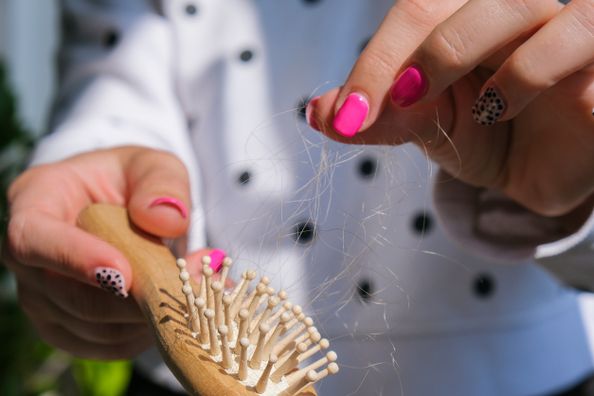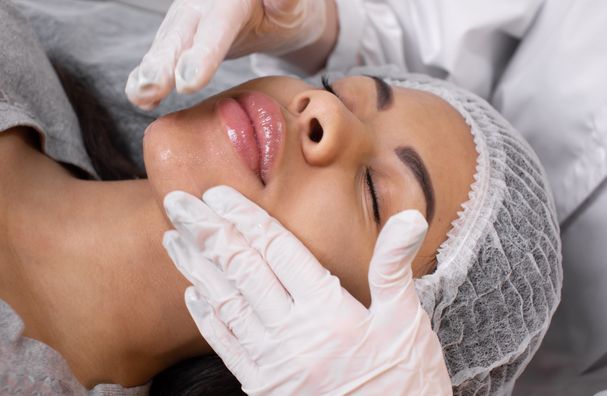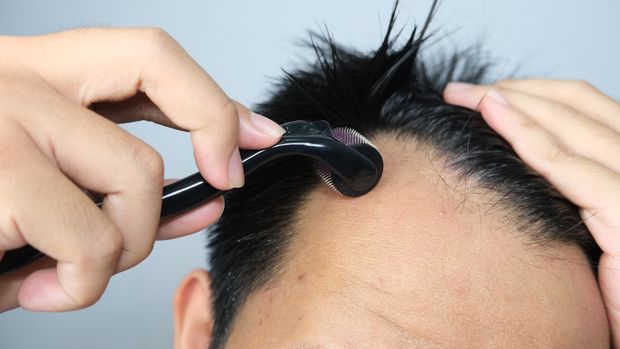There are many reasons why women lose their hair. Before considering treatment options, it’s important to seek a professional opinion from a board-certified dermatologist who can determine the cause and treat it.
Hair Shedding vs. Hair Loss
Although excessive shedding may cause concern, there’s a difference between hair loss and hair shedding. Most people will lose between 50 and 100 hairs a day when they shed. It’s considered excessive hair shedding when the body sheds more than that. A Duly Health and Care dermatologist will be able to determine the cause of your hair loss.
Are you worried that you’re losing too much hair? There could be several reasons why it’s falling out. Schedule an appointment with a Duly dermatologist so they can find a treatment that puts a stop to the hair loss.
Here’s Why Your Hair Might Be Falling Out
It’s normal for women to experience hair loss as they age. In fact, for most women, hair loss can begin in their 40s or even earlier. Hair loss can affect any woman, but here are 6 reasons your hair might be falling out — and what to do about it.
1. Recent Childbirth
After having a baby, hair loss can be common. Telogen effluvium is a condition of excessive hair shedding that can occur after pregnancy. Although this can be considered excessive shedding because it’ll grow back on its own, you won’t have to do anything but wait. With time, your hair should return to its normal volume by your child’s first birthday.
2. Undergoing Chemotherapy
Hair loss from chemotherapy happens because your hair follicles can become damaged from chemotherapy drugs, causing your hair to fall out. This isn’t a permanent side effect, though, and there are things you can do to cope with it. Some people wear wigs. Others wear head scarves. You may even consider shaving your hair until it grows back.
When your hair begins to grow back after treatment, it will be fragile at first. It may also grow back differently than it was before. For instance, it may be curly when it was straight before. Or it may be thick when it was previously fine. This is usually a temporary change.
3. Hairstyles That Pull
How you wear and style your hair can also cause hair loss. If you’re wearing hairstyles that pull your hair tight, that could be the cause. Traction alopecia is when your hair roots are forcefully pulled. There are several ways you can treat this — many you can do right at home, such as wearing looser hairstyles.
4. Stress
If you’ve been feeling increased levels of stress in your life, it’s quite possible that your hair loss is related to that. When dealing with chronic stress, your hair follicles are affected by the stress hormone corticosterone. Thankfully, your body will naturally stop the excessive shedding when the stress stops, though it may take up to 9 months for your hair to regain its fullness. So, talk to your provider or a counselor about some ways to destress.
5. Genetics
If your hair loss is related to genetics, that means you inherited a gene from one or both of your biological parents. You’ll want to talk to a board-certified dermatologist if others in your family have experienced hair loss, and now you are too. Although some treatments won’t work for everyone, they’ll be able to recommend a treatment — that might include injectable treatments such as Platelet Rich Plasma therapy, topical medication or pills. There are also other alternatives such as wigs, a sew-in, or a hair transplant.
6. Autoimmune Disease
Sometimes your immune system doesn’t function how it’s supposed to. This can happen if you’re diagnosed with alopecia areata. It’s an autoimmune disease where your hair follicles are attacked by your immune system, which causes hair loss. If it’s alopecia, there are treatments that might work for you such as oral and injectable medications.
What Can You Do?
No one wants to experience hair loss, but there are many treatment options and lifestyle changes to have you looking and feeling your best again. It’s okay if you’re worried, but in some cases your hair may grow back on its own. The good thing is you don’t have to figure this out alone. You can schedule an appointment with a Duly board-certified dermatologist who will be able to explore the possible causes and offer recommendations. Some might include lifestyle and home remedies.If your hair loss is caused by an underlying disease, treatment for that disease may be necessary. Medications are available to treat hereditary baldness.
Losing your hair might bring up different emotions, and that’s completely normal. For many people, it’s a part of their identity. By seeing a board-certified dermatologist, you’ll be able to choose a treatment plan that’s best for you and find ways to boost your overall confidence.
Health Topics:








